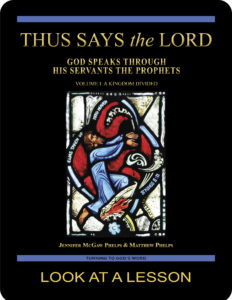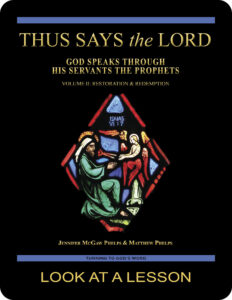from of old
 Although most people are familiar with the prophet Micah’s foretelling where the Messiah would be born, the same prophecy also has something important to say about the temporal nature of the new king. The fifth chapter in the Book of Micah (NABRE) contains a powerful prophecy about the coming Messiah that strongly suggests that the Messiah will be both God and human. As is often the case with such prophecies, its meaning works on multiple levels, and one word in particular works to shape this double meaning.
Although most people are familiar with the prophet Micah’s foretelling where the Messiah would be born, the same prophecy also has something important to say about the temporal nature of the new king. The fifth chapter in the Book of Micah (NABRE) contains a powerful prophecy about the coming Messiah that strongly suggests that the Messiah will be both God and human. As is often the case with such prophecies, its meaning works on multiple levels, and one word in particular works to shape this double meaning.
The Hebrew word קֶדֶם (qedem) is translated in the Mass readings as “from ancient times.” This word literally means “east” but also has a temporal sense meaning “before.” Taken in its extreme, this temporal sense also comes to mean “ancient” or even “beginning.”
Micah’s prophecy about Bethlehem works on two levels. The new king will be like the ancient king, David, who was from Bethlehem. More than that, however, the new king will be like the people’s original king who is from the beginning—God himself. This Messiah, as we know in hindsight, is both a descendant in David’s line and God.
you also may like our two-part study of the prophets

 Thus Says the LORD: God Speaks Through His Servants the Prophets—Volume I: A Kingdom Divided examines the prophets in their historical context using the First and Second Books of the Kings and other Old Testament passages written before the Babylonian Exile in 586 B.C. Volume II: Restoration & Redemption looks at the post-exilic prophets. This 51-lesson Catholic Bible study builds on The United Kingdom of Israel: Saul, David & Solomon Foreshadow Christ the King. Click on the books’ covers to view a sample lesson from each volume.
Thus Says the LORD: God Speaks Through His Servants the Prophets—Volume I: A Kingdom Divided examines the prophets in their historical context using the First and Second Books of the Kings and other Old Testament passages written before the Babylonian Exile in 586 B.C. Volume II: Restoration & Redemption looks at the post-exilic prophets. This 51-lesson Catholic Bible study builds on The United Kingdom of Israel: Saul, David & Solomon Foreshadow Christ the King. Click on the books’ covers to view a sample lesson from each volume.
 Click on the picture of the statue of Moses with horns (above) to learn more about Lost in Translation. A new entry is archived each Monday. Contact us to receive Lost in Translation by email every week. You may use any of the contact links on our website to ask Matthew a question.
Click on the picture of the statue of Moses with horns (above) to learn more about Lost in Translation. A new entry is archived each Monday. Contact us to receive Lost in Translation by email every week. You may use any of the contact links on our website to ask Matthew a question.
